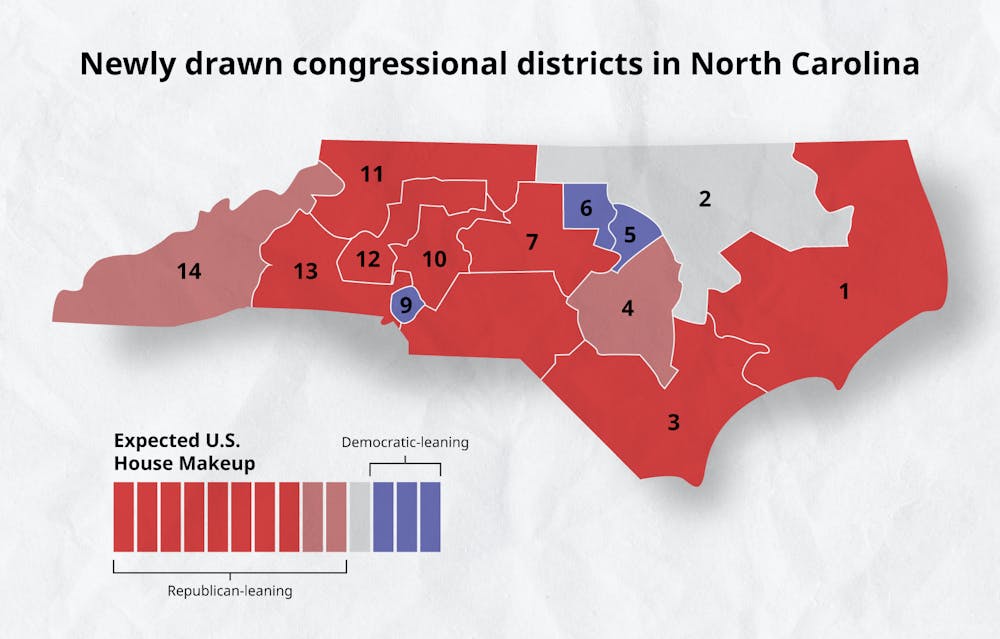“Republicans, once again, made it about as strong of a partisan gerrymander as they could possibly manage,” said N.C. Rep. Graig Meyer, D-Caswell, Orange.
Concerns around the lack of racial data
On Oct. 29, a group including the North Carolina NAACP, Common Cause and individual North Carolina voters backed by the Durham-based Southern Coalition for Social Justice sued North Carolina legislators in the Wake County Superior Court, claiming that the decision of the N.C. General Assembly's redistricting committees to not consider race data in drawing districts violates the Voting Rights Act of 1965, which prohibits racial discrimination in voting.
“Once again, state redistricting leaders have failed North Carolinians by redrawing voting districts for political gain and depriving voters of color of their constitutional rights to fair political representation,” said Allison Riggs, the Southern Coalition for Social Justice's co-executive director and chief counsel for voting rights, in an Oct. 29 press release. “State law requires that lawmakers first draw districts that comply with the VRA (Voting Rights Act), and they simply can’t do that without considering race.”
Still, some Republicans stand behind the decision not to use racial data in drawing up the new maps.
Andy Jackson, director of the Civitas Center for Public Integrity at the John Locke Foundation, a conservative-leaning think tank based in Raleigh, said in a research brief on the foundation's website that banning the use of racial data in the redistricting process actually helps make sure the state isn’t accused of violating the Voting Rights Act.
“Once racial data are introduced into the redistricting process, legislators will not be able to unsee the data they have seen and will be vulnerable to charges that racial considerations predominated in drawing districts,” Jackson wrote in the brief.
Concerns of partisan gerrymandering
In 2019, a group of voters backed by the National Redistricting Foundation, a nonprofit affiliated with former Attorney General Eric Holder’s National Democratic Redistricting Committee, sued several North Carolina legislators, as well as the state, alleging a partisan gerrymander in the state's 2016 maps. On Nov. 5, 2021, they added a supplemental complaint to their lawsuit, Harper v. Lewis, addressing the 2021 maps.
In an email, Brooke Lillard, deputy communications director for the National Democratic Redistricting Committee, noted two main issues with the 2021 redistricting process that are referenced in the complaint.
The complaint alleges that while political data was not allowed to be uploaded to the computers used in drawing the new maps, legislators made use of a loophole that allowed them to bring maps that were drawn previously using partisan data into the room and copy them onto the computers.
The complaint also mentions how public hearings about the maps were held at 64 sites across the state in 2011, the last year the districts were redrawn not as the result of litigation, while in 2021, they were only held at 13 different locations.
To get the day's news and headlines in your inbox each morning, sign up for our email newsletters.
“Unsurprisingly, this process resulted in the General Assembly enacting another extreme partisan gerrymander, just as it did in 2016,” Lillard said in an email. “On party-line votes in both chambers of the General Assembly, Republicans pushed through the new map over objections and allegations of foul play. Like the 2016 plan, the 2021 plan meticulously packs and cracks Democratic voters in every district — without exception.”
Meyer said he believed Republican state legislators were making decisions outside of public view.
"We don't have any idea what they (Republican lawmakers) did behind closed doors," Meyer said. "What they did in public was they drew maps. But they clearly came into the public view to draw the maps with some idea of what they were going to draw, so they were doing something behind closed doors.”
Meyer said that while issues in the process are important, it's the results — the maps themselves — that really matter.
“The biggest issue is that they drew maps that don't represent the people of North Carolina,” he said. “And that will result in Republican majorities and possibly supermajorities when the people of North Carolina want competitive elections and want balanced government.”
@drichman27
@DTHCityState | city@dailytarheel.com



